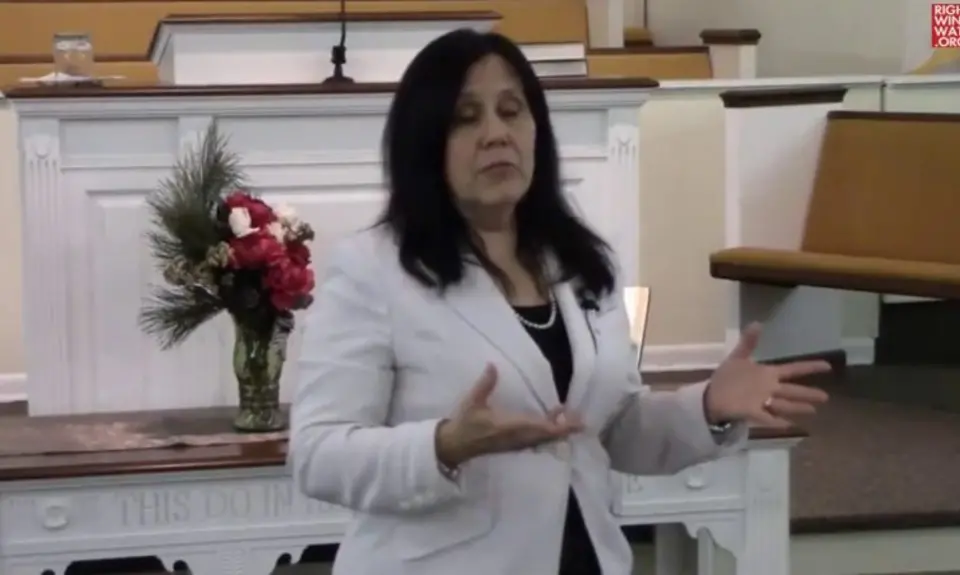Cynthia Dunbar, a longtime Religious Right activist who is now running for Congress in Virginia, spoke at Skyline Baptist Church in her district last month, where she repeated several pieces of misinformation that came directly from right-wing pseudo-historian David Barton.
"Our nation truly was birthed on Judeo-Christian principles," she said. "I became convinced that it wasn't just conceived in the minds of men, but that it was actually birthed in the heart of the Father."
"If you actually understand the political philosophy that [the Founding Fathers] were basing it on, they spoke biblical worldview fluently," Dunbar insisted. "As far as their ideology and their understanding, they understood Judeo-Christian tenets and you could tell that 94 percent of the quotes of the Founding Fathers contemporaneous to our founding came either directly or indirectly from the holy scripture."
Dunbar also asserted that the model for our three branches of government came directly out of Isaiah 33:22 and that the idea of separation of powers was rooted in Jeremiah 17:9, both of which are absurd claims that originated with Barton.
The false claim that 94 percent of the quotes from the Founding Fathers came either directly or indirectly from scripture is also something that Dunbar took from Barton and is rooted in Barton's misrepresentation of a 1984 study that was debunked years ago:
Let's begin with Barton's 94% figure. In the videotape, Barton breaks it down as follows: 34% of the founder's quotations were taken directly from the Bible, and 60% were from authors that base their conclusions on the Bible. The 34% figure, at least, is accurate; this corresponds exactly to Lutz's and Hyneman's conclusions with respect to the total percentage of citations between 1760 and 1805. But where does the 60% figure come from? Not from the paper; Lutz and Hyneman provide no category of citations that even remotely corresponds to "authors that base their conclusions on the Bible." Rather, the 60% figure is manufactured by Barton himself on the basis of his own reading of other authors that scored highly in Lutz and Hyneman's survey, people like Montesquieu, Blackstone, and Locke. You would not know this from the videotape, which reports the 60% figure as if it were the conclusions of Lutz and Hyneman themselves. [Note: there are a number of problems with this 60% figure. In particular, Barton overstates the degree to which these authors used the Bible in reaching their own conclusions. We'll do an article on this issue at a later time.]
Beyond this, what exactly does this 94% figure prove? Barton wants us to think that because the founders quoted at length from the Bible, or people that quoted the Bible, the Constitution must somehow embody Biblical law, be "based" on the Bible, or otherwise have the Bible in mind. But this doesn't follow; the fact that the Bible was frequently quoted is not the same thing as saying it was quoted for the purpose of creating a legal code or the Constitution. Indeed, Lutz's and Hyneman's data suggest that the Bible was for the most part irrelevant to the Constitution, and that what connections there were between the Bible and the Constitution are not of the type that support Barton's claims.
First, Barton does not report the most relevant evidence from Lutz's article: in addition to their general citation count from 1760 to 1805, Lutz and Hyneman compile a count specific to political debate on the Constitution between the years 1787 and 1788 (the years corresponding to the drafting and ratification of the Constitution). According to Lutz, this sample "comes close to exhausting" the literature written on the Constitution during this period (Relative Influence, p. 194). If the founders believed that the Bible was truly relevant to the Constitution, Biblical citations should appear in abundance in this sample, but, they don't. On the contrary, Biblical citations are virtually nonexistent in this sample. According to Lutz, federalist (i.e., pro-Constitution) writers never quoted the Bible in their political writings between 1787 and 1788. Conversely, anti-federalist writers quoted the Bible only 9% of the time. According to Lutz:
The Bible's prominence disappears, which is not surprising since the debate centered upon specific institutions about which the Bible has little to say. The Anti-Federalists do drag it in with respect to basic principles of government, but the Federalist's inclination to Enlightenment rationalism is most evident here in their failure to consider the Bible relevant....The debate surrounding the adoption of the Constitution was fought out mainly in the context of Montesquieu, Blackstone, the English Whigs, and major writers of the Enlightenment (Relative Influence, pp. 194-195, emphasis ours).
If Dunbar does manage to make it to Congress, she'll probably become fast friends with Rep. Barry Loudermilk, who is also a student of the David Barton school of false American history.






